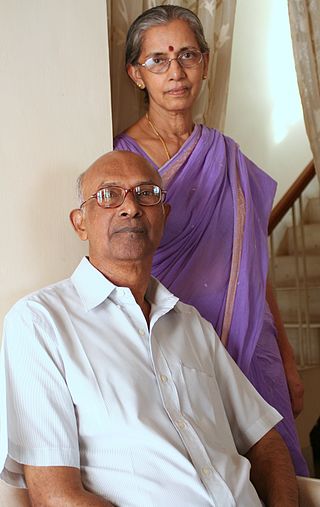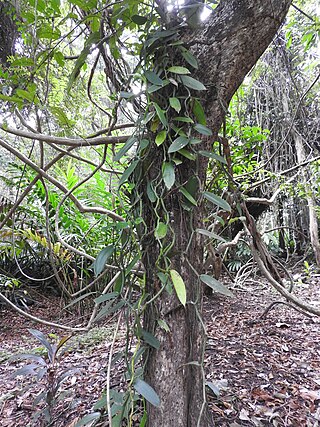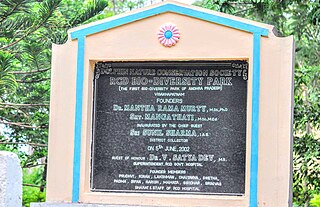Odakkali, located at 10.09 North and 76.54 Eastis a village in the Ernakulam district of Kerala State, in southern India. Odakkali is 26.8 km away from Aluva in Aluva Munnar Road.

Fairchild Tropical Botanic Garden is an 83-acre (34 ha) botanic garden with extensive collections of rare tropical plants including palms, cycads, flowering trees, and vines. It is located in the city of Coral Gables, Miami-Dade County, just south of Miami, surrounded at the north and west by Matheson Hammock Park.

The China National Botanical Garden is a national botanical garden located in Haidian, Beijing, China. Chartered in 2022, the garden is co-sponsored by the National Forestry and Grassland Administration, the Ministry of Housing and Urban-Rural Development, the Chinese Academy of Sciences, and the Beijing Municipal People's Government.

Botanical Survey of India (BSI) located in Kolkata, West Bengal, India. It was founded on 13 February 1890, is Government of India Ministry of Environment, Forest and Climate Change's organization for survey, research and conservation of plant wealth of India, flora and endangered species of India, including by collecting and maintaining germplasm and gene bank of endangered, patent and vulnerable plant species.

The San Juan Botanical Garden, officially known as the Botanical Garden of the University of Puerto Rico, is located in the Caribbean city of San Juan, capital of Puerto Rico. This lush 300-acre (1.2 km2) “urban garden” of native and exotic flora serves as a laboratory for the study, conservation and enrichment of plants, trees, flowers, grasses and many other plants. Seventy-five acres are landscaped and open to the general public as well as researchers.

Madhuca diplostemon is a species of flowering plant in the family Sapotaceae, endemic to India. It is a threatened tree species of the Western Ghats whose original specimens were collected in 1835, and it was considered extinct for 184 years until a single living specimen was discovered in a sacred grove in Kollam district, when scientists at the Jawaharlal Nehru Tropical Botanic Garden and Research Institute (JNTBGRI) identified the tree as Madhuca diplostemon rather than the common attilippa.

Itty Achudan , known to have lived during the second half of the 17th century, was a distinguished herbalist, belonging to an Ezhava family of physicians in Kerala who practised pre-Ayurvedic systems of traditional medicine. The Kollatt family are natives of Kadakkarappally, a coastal village, north-west of Cherthala town, in Kerala, South India. Itty Achudan was the most remarkable Indian figure associated with Hortus Malabaricus, the botanical treatise on the medicinal properties of flora in Malabar, in the 17th-century. It was compiled by the Dutch Governor of Malabar, Hendrik van Rheede, and Itty Achudan was Van Rheede's key informant who disclosed the pre-Ayurvedic traditional knowledge about the plants of Malabar to him. Hortus Malabaricus was published posthumously in Amsterdam between 1678 and 1693. The preface to Hortus Malabaricus includes a mentioning about Itty Achudan and a testimony revealing his contribution in his own hand writing. Itty Achudan was introduced to Van Rheede by Veera Kerala Varma, the then ruler of the erstwhile state of Kochi.

Kattungal Subramaniam Manilal is an Emeritus of the University of Calicut, a botany scholar and taxonomist, who devoted over 35 years of his life to research, translation and annotation work of the Latin botanical treatise Hortus Malabaricus. This epic effort brought to light the main contents of the book, a wealth of botanical information on Malabar that had largely remained inaccessible to English-speaking scholars, because the entire text was in the Latin language.

Palode is a town in Thiruvananthapuram district in the Indian state of Kerala. Palode town is 35 km (22 mi) from Thiruvananthapuram city and 17 km (11 mi) from Nedumangad municipality.There is a Helipad in palode. Palode is surrounded by Western Ghats. Jawaharlal Nehru Tropical Botanic Garden and Research Institute is situated near Palode. Mankayam Ecotourism near Brimore is 11 km (6.8 mi) away. Brimore has tea estate and plantations make Palode a gateway for tourism destination.Thenmala is 38 km (24 mi) from Palode and Ponmudi hills is 35 km. Palode is a town in Thiruvananthapuram-Thenmala -Shenkottai State Highway 2 (Kerala). Tenkasi is 75 km (47 mi) from Palode. Palode is a town located in Nedumangad Taluk of Thiruvananthapuram district in Kerala.

Vanilla andamanica is an endangered wild relative of commercial vanilla, Vanilla planifolia, the source of vanilla essence. It grows in the Andaman and Nicobar Islands, India in the Bay of Bengal., and classified as a Vulnerable species (VU) by the IUCN Red List.

The South China National Botanical Garden of the Chinese Academy of Sciences is a large botanical garden in Tianhe District, Guangzhou, Guangdong province in southern China.

The flora of China consists of a diverse range of plant species including over 39,000 vascular plants, 27,000 species of fungi and 3000 species of bryophytes. More than 30,000 plant species are native to China, representing nearly one-eighth of the world's total plant species, including thousands found nowhere else on Earth. China's land, extending over 9.6 million km, contains a variety of ecosystems and climates for plants to grow in. Some of the main climates include shores, tropical and subtropical forests, deserts, elevated plateaus and mountains. The events of the continental drift and early Paleozoic Caledonian movement also play a part in creating climatic and geographical diversity resulting in high levels of endemic vascular flora. These landscapes provide different ecosystems and climates for plants to grow in, creating a wide variety of different flora spanning over not just China, but different parts of the world.

Henarathgoda Botanical Garden, also known as Gampaha Botanical Garden, is one of the six botanical gardens in Sri Lanka. The botanical garden is situated on the Gampaha-Minuwangoda main road, approximately 450 m (1,480 ft) away from Gampaha railway station. It is about 29 km (18 mi) from Sri Lanka's commercial capital of Colombo.
Themath Soman Nayar is an Indian Conservation Biologist specialized in plant-animal interaction, angiosperm taxonomy and palynology. He was trained in these fields from Botanical Survey of India, Sardar Patel University and Birbal Sahni Institute of Paleobotany. From 1991 to 2012 he was the Head of the Division of Conservation Biology, Jawaharlal Nehru Tropical Botanic Garden and Research Institute, Thiruvananthapuram.
Melocanna baccifera is one of two bamboo species belonging to the Melocanna genus. It grows up to 10–25 m tall. It is native to Bangladesh, Myanmar, India, and Thailand.
Purwodadi Botanical Garden is a research centre in Purwodadi, Pasuruan, East Java, Indonesia. It has an area of 85 hectares and more than 10,000 types of trees and many plant collections. Callus cultures of Agave amaniensis by Setia Dewi were taken in 1988.

The VILAR Botanical Garden is a Botanical Garden in Moscow at the All-Russian Research Institute of Medicinal and Aromatic Plants. It is located in the south of the city in the area of Northern Butovo. It was founded in 1951. The garden area is about 30 hectares. Botanical Garden VILAR has the status of a specially protected natural area of federal significance.
Rani Chandramani Devi Government Hospital is a children's hospital located at Pedda Waltair, Visakhapatnam, India.

Biodiversity Park, Visakhapatnam, is a botanical garden, an ex situ conservation park, first of its kind in Visakhapatnam, Andhra Pradesh, India. The park is located in the premises of the Rani Chandramani Devi Government Hospital. It extends over 3 acres (1.2 ha). Dolphin Nature Conservation Society (DNCS), Visakhapatnam, a registered, eco-friendly, non-government organization, has maintained it for 13 years and is now maintaining it in collaboration with the hospital and Visakhapatnam Metropolitan Region Development Authority. The park was inaugurated on 5 June 2002. This park has more than 2,000 species of plants. and has recorded visits by 60 species of birds and 105 species of butterflies. The park has become a "living laboratory" for education, awareness and research for students, and botanists, zoologists and researchers.






















